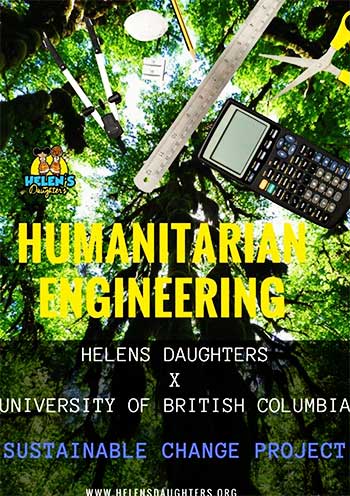PRESS RELEASE – THE Sustainable Change Program of local non-profit, Helen’s Daughters, has been selected out of hundreds of proposals as an experimental case study by the University of British Columbia (UBC) for one of its major courses in Humanitarian Engineering, which kicked off in the beginning of February and will last for twelve weeks. Helen’s Daughters is a St. Lucian non-profit with a special focus on rural women’s development and was first formed as part of a winning proposal for UN Women’s Empower Women Champions for Change Program. It was one of only two projects selected in the Caribbean region in November 2016 out of 4,000 proposals for the Empower Women Champions for Change Program.
“The partnership seeks to equip rural women with technical expertise on climate resilient practices while also allowing the engineering students to acquire more in-depth knowledge of the agricultural complexities that exist in countries susceptible to climate change like St. Lucia.” says KeithlinCaroo, founder of Helen’s Daughters.
 “It is also an effort to support the recent initiatives of our Caribbean Governments to “build back better” as the first climate-resilient countries in the world,” she added.
“It is also an effort to support the recent initiatives of our Caribbean Governments to “build back better” as the first climate-resilient countries in the world,” she added.
The UBC Humanitarian Engineering team comprised third to fifth year geological, chemical and biological engineering students at the University of British Columbia, Vancouver, Canada. Team members Tatjana Stone, Prangthip Sup Prakobkit, Shawn Matthies, Dana Mraz and Katherine West will collaborate with four rural women farmers who form a part of Helen’s Daughters. Ms. Dannie James, a farmer and fisherwoman from Vieux Fort, Mrs. Uraline Alphonse, an organic aquaponics farmer from Desruisseaux, Mrs. Virginia Jules, a farmer from Babonneau and Ms. Wilbertha Wilson, a farmer, fisherwoman and confectioner from Mon Repos, will share their combined experience of over forty years in agriculture and will receive in return access to the latest research in technological innovation in agriculture. This type of researcher-farmer partnership aims to explore methods for climate resilient practices and technology and to identify appropriate sources of renewable energy for farming in St. Lucia. The project will culminate in an on-site training to empower local rural women to incorporate the outcomes of this project.
“We hope that in the near future, the land identified for the project could be used as a land bank for self-employed women farmers, thereby creating economic opportunities for them while also serving as a research entity for sustainable and climate resilient farming practices” said Caroo.
To learn more about the initiative and how to support it, visit the Helen’s Daughters website http://helensdaughters.org/ Facebook page (helensdaughters.slu), Instagram page (@helensdaughters.slu) or email: info@helensdaughters.org
THE Sustainable Change Program of local non-profit, Helen’s Daughters, has been selected out of hundreds of proposals as an experimental case study by the University of British Columbia (UBC) for one of its major courses in Humanitarian Engineering, which kicked off in the beginning of February and will last for twelve weeks. Helen’s Daughters is a St. Lucian non-profit with a special focus on rural women’s development and was first formed as part of a winning proposal for UN Women’s Empower Women Champions for Change Program. It was one of only two projects selected in the Caribbean region in November 2016 out of 4,000 proposals for the Empower Women Champions for Change Program.
“The partnership seeks to equip rural women with technical expertise on climate resilient practices while also allowing the engineering students to acquire more in-depth knowledge of the agricultural complexities that exist in countries susceptible to climate change like St. Lucia.” says KeithlinCaroo, founder of Helen’s Daughters.
“It is also an effort to support the recent initiatives of our Caribbean Governments to “build back better” as the first climate-resilient countries in the world,” she added.
The UBC Humanitarian Engineering team comprised third to fifth year geological, chemical and biological engineering students at the University of British Columbia, Vancouver, Canada. Team members Tatjana Stone, Prangthip Sup Prakobkit, Shawn Matthies, Dana Mraz and Katherine West will collaborate with four rural women farmers who form a part of Helen’s Daughters. Ms. Dannie James, a farmer and fisherwoman from Vieux Fort, Mrs. Uraline Alphonse, an organic aquaponics farmer from Desruisseaux, Mrs. Virginia Jules, a farmer from Babonneau and Ms. Wilbertha Wilson, a farmer, fisherwoman and confectioner from Mon Repos, will share their combined experience of over forty years in agriculture and will receive in return access to the latest research in technological innovation in agriculture. This type of researcher-farmer partnership aims to explore methods for climate resilient practices and technology and to identify appropriate sources of renewable energy for farming in St. Lucia. The project will culminate in an on-site training to empower local rural women to incorporate the outcomes of this project.
“We hope that in the near future, the land identified for the project could be used as a land bank for self-employed women farmers, thereby creating economic opportunities for them while also serving as a research entity for sustainable and climate resilient farming practices” said Caroo.
To learn more about the initiative and how to support it, visit the Helen’s Daughters website http://helensdaughters.org/ Facebook page (helensdaughters.slu), Instagram page (@helensdaughters.slu) or email: info@helensdaughters.org





![Simón Bolívar - Liberator of the Americas [Photo credit: Venezuelan Embassy]](https://thevoiceslu.com/wp-content/uploads/2025/12/Simon-Bolivar-feat-2-380x250.jpg)



